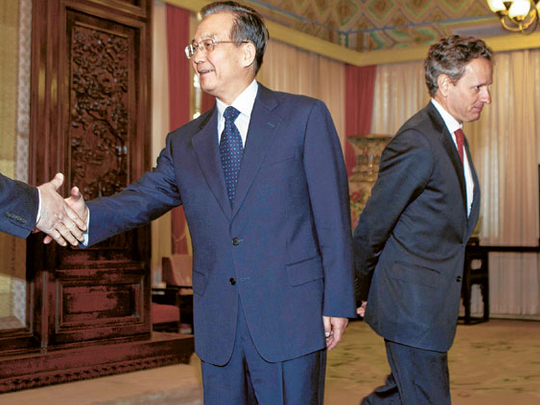
Riyadh: China's Wen Jiabao must balance his country's need for Iranian crude with its budding energy partnership with Saudi Arabia on his first visit to the Gulf kingdom, a US-based specialist in Middle East security said.
The Chinese premier's trip today comes amid signs that tighter economic sanctions may stop Iran, Opec's second-largest producer after Saudi Arabia, from selling its oil. Wen will also visit Qatar and the United Arab Emirates, fellow members of the Organisation of Petroleum Exporting Countries, during a Gulf tour ending on Thursday.
"China seems quite reluctant to get on the wrong side of Iran, given the tensions existing in the region and Iran's importance for its oil," Paul Sullivan, a political scientist specialising in Middle East security at Georgetown University in Washington, said in an email.
Wen will become the most senior Chinese leader to travel to Saudi Arabia since President Hu Jintao in 2009. His visit will begin as Saudi Arabian Oil Co and China Petroleum & Chemical Corp sign an agreement for a proposed refinery on the Red Sea coast. Sinopec's planned 37.5 per cent stake in the Yanbu plant would make it China's first investment in a Saudi oil facility.
The European Union and the US are weighing more stringent sanctions against Iran over its nuclear programme.
Alternative sources
An EU embargo on purchases of Iranian crude, to be decided on January 23, will probably be delayed for at least six months to let countries such as Greece, Italy and Spain find alternative supplies, according to an official with knowledge of the talks. The countries accounted for 68.5 per cent of EU oil imports from Iran in 2010, according to European Commission data.
While China has voted for four rounds of United Nations sanctions on Iran, its leaders have criticised separate efforts to expand US and European curbs. Vice-Foreign Minister Zhai Jun told reporters on Wednesday in Beijing that China needs oil for its development and hopes imports won't be affected. China is the biggest importer of Iranian crude, buying 22 per cent of the nation's oil in 2010, according to the US Energy Information Administration.
Wen may ask for Saudi Arabia to tap some of its spare production capacity to keep markets supplied in the event of an embargo of Iranian crude, Sullivan said. "China has to walk a very fine line in the Gulf and has to work within very complex nuances and political and economic landmines in the region," he said.
"Some countries are trying to get a pledge that Saudi Arabia would replace Iranian crude," Olivier Jakob, managing director of Zug, Switzerland-based consultant Petromatrix GmbH, said in a phone interview. "The Saudis have been saying they don't want to enter into the politics of the issue and are keeping the line that they will supply what the market needs."












